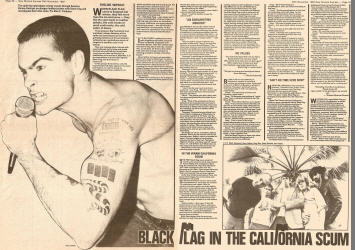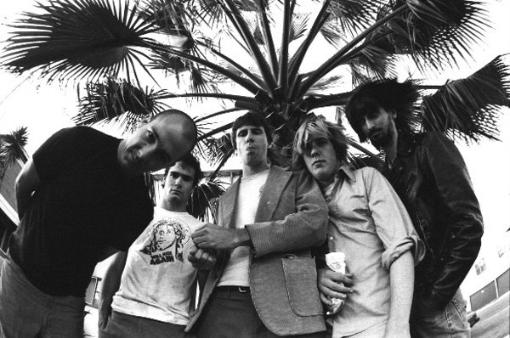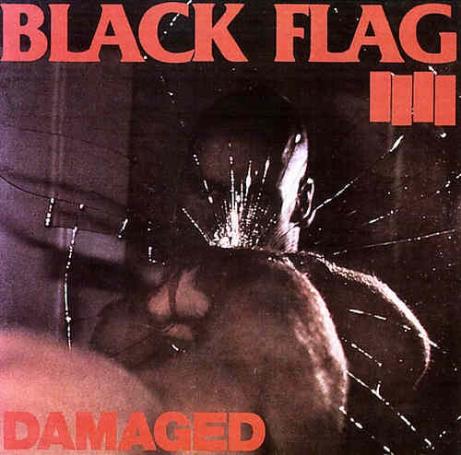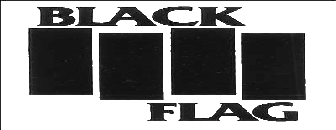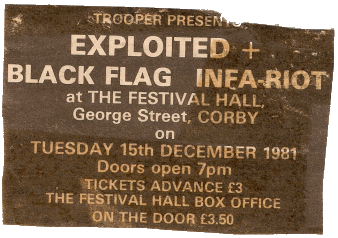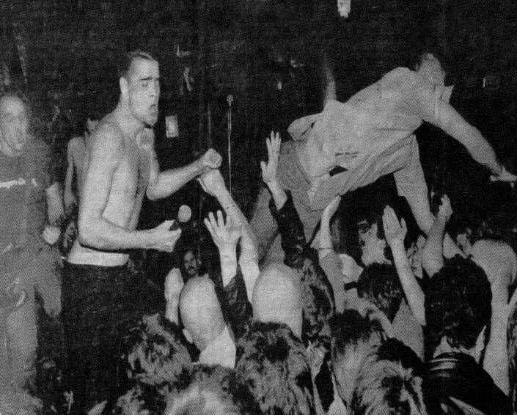REPRINTED FROM NME 20TH NOVEMBER 1982
BLACK FLAG IN THE
CALIFORNIA SCUM
The spike-top apocalypse creepy crawls through America.
Barney Hoskyns exchanges leather jackets with Black Flag and investigates
their total noise.
Pix Glen E. Friedman.
ENGLISH WIPEOUT
WHEN BLACK-FLAG came to England last 'winter, they felt more than the ice and snow - they felt
the cold studs on leather jackets, the cold masks of punk conformity, the cold pallor of decay.
They played a big Punkstock and watched a dozen factions of the spike-top apocalypse go through
grinding motions of forced despair, whipping up a gratuitous storm of slogans in another rock'n'roll
teacup.
They saw teenage ghoul clones with eyes hollowed out by glue and speed. the kind who still fall out
of bed each morning and make up like they're auditioning to be extras in Mad Max 2. In the
backstreets of provincial England. Black Flag saw the troops of tomorrow....
Of the groups themselves, only the imperishable UK Subs appeared to enjoy themselves, to use the
event as something more than a platform on which to whine and churn and groan. For the rest it
was a solemn circus, not Dick's/Oskey's circus of death, just one of morose resignation to uniform,
straitjacketed sentiments they'd played scant part in formulating.
If - like Black Flag - you chose not to scream unintelligibly of threat tubes, or ' had hair over your
ears, or came from Torrance, California; you were palpably betraying a cause - one all the more
oppressive for its vagueness. At the day's end, the spectacle's only common denominators were its
identification tags.
"IT'S SO FUNNY reading interviews with
English punk bands, because they're literally
disgusted with American bands. They don't
dress right, they don't sing about anarchy,
nuclear war, or the dole. Or they're rich white
kids, their hair is long, and they're wearing
sneakers instead of combat boots."
Henry Rollins, the heavy-set apprentice
psycho who became Black Flag's vocalist in
the summer of '81, is on crutches, nursing an
injury sustained in the course of onstage duty
during the group's latest American tour.
Assisting him on and off his feet are the two
original Flaggers Greg Ginn (lead guitar),
and Chuck Dukowski (bass.) We are exchanging cultural assumptions and blindfolds in their
Hermosa Beach headquarters, 30 miles south of Los Angeles.
"People were coming up to me in England and going, You guys are pretty good but you should, like,
spike your hair and get some leather pants and you'd be really happening."
So what did you do, fellas?
Henry: "I cut off my mohawk 'cause I didn't wanna make Wattie look bad."
Chuck: "I sold my leathers to pay the culture tariff."
"AN EXHILARATING ANGUISH"
IN AMERICA, far from the sullen ranks of The Exploited, Black Flag are a force of change. Without
ever assuming the mantle of leadership in the hardcore stakes, they act as a covert catalyst
wherever their tours - or, in a phrase they borrowed from the jargon of Charles Manson, their
"creepy crawls" - take them.
They are neither agents of disaster nor prophets of liberation. They do not ask their admirers to
execute Ronald Reagan. They simply play music at once brutal and sensual, impatient and
deliberate, incensed and exultant. You don't need to follow Discharge or The Dead Kennedy's to
love 'Damaged'.
You don't even need to
follow punk. 'Damaged' is
scorching and unbridled
and causes riots of the
mind. It is pure aggression,
pure pain, pure electricity.
Its love songs are battle
cries, its hate songs pleas
for toleration. 'Damaged'
says: our lives seem to be
set to auto-destruct, but if
we only dared, we might
find another way out.
'Damaged' is not a musical
chamber of horrors: like
the best heavy metal, it's
an iron butterfly. "A
bonemashing precise
sound" is one description I
like. "TNT," said Garry
Bushell; "Total Noise
Tirade." "A speciality
music," ventured one
polite midwestern
commentator. And the
group's own producer,
half-black one-man
holocaust Spot, said "they are as comforting as the screams that relieve pain."
"I don't like the way most records are produced," says Greg.
"We don't want a big kick drum sound. We don't want to punch."
Chuck: "The people who didn't like it said, You guys could sound like Van Halen if you wanted to ... "
Greg: "Most of the productions that are being done are by people who want you to hear every detail
of the recording, who want the listener to dissect the sound. To clean up the recording you have to
sacrifice all the original feeling."
'Damaged' incorporates everything from the anthemic vengeance of 'Rise Above' to the zombie
mayhem of 'TV Party' and 'Six Pack'. Its guitars are a field force of feedback and distortion; the bass
drum is sunk deep as a heartbeat, the cymbals and hi-hat hiss like snakes; the bass lunges, chews
and spits out entrails of rhythm. This is an elemental, unified sound which comes at you in one
burning wave, and you go under with your arms flying. The songs are cut-up, convulsive; spliced,
epileptic. Above all, the sound is one of true, internal power. Rollins' voice is a tornado in a sewer.
Previous heights of such ecstasy include only the 5's 'Kick Out', The Saints' 'Nights In Venice', and
(dare I say it?) 'Loose'. 'Room 13', 'Life Of Pain' and 'What I See' are love songs and electric
seizures of the soul.
Black Flag are the only progressively retarded group on earth.
IN THE WARM CALIFORNIA SCUM
THE FIRST black flag was a symbol of anarchy, the second a roach exterminator (hence killing Ants
at 50 paces). Black Flag, the musical unit, were first unfurled in 1977, after one Gregory Ginn saw
The Ramones at LA's Roxy. From remote Hermosa Beach, the UK vanguard fleet of 'New Rose',
'Grip' and 'Anarchy' had yet to be sighted. Under their initial nomenclature, Panic, the group's first
singer was current Circle Jerk Keith Morris: his crazed Iggy/Strummer/Rotten rant of a voice made
'Nervous Breakdown' (recorded '78, released '79) a definitive punk classic. With its maximum
buzzsaw guitar and brain-drilling drum part, it was nothing short of the Detroit sound on a
Methedrine overdose. With its flips 'Fix Me' 'Wasted', the EP is quite as good as anything by The
Troggs or The Viletones.The Circle Jerks being an obvious antidote, Keith Morris bowed out of
Black Flag when Greg's'songs began to take on a more serious tenor.
'Jealous Again', a five song, 12-inch EP featuring the voice of Ron Reyes, aka Chavo Pederast, fell
far short of the manic ebullience of 'Breakdown", but included the infamous 'White Minority', a song
shortsightedly construed as an affirmation of suburban (read Orange County) racism.
Black Flag insisted that the song was satirical, but with their growing reputation for inciting violence
in their audiences, it made little difference. As the LA Weekly put it, "That an extraordinarily loud,
raw, and obviously serious, humourless and illiterate band like Black Flag could be satirical at all
was beyond the comprehension of a lot of observers at first. Black Flag were seen instead as racist,
revolutionary zealots intent on leading their maniacal followers through the night-clubs of the city,
the states and the nation, leaving nothing intact in their wake."
Wherever they went, the group's notoriety travelled ahead. After Dez Cadena, son of jazz producer
Ozzie, took over vocals from the said Pederast, police aborted a show at the Whisky A Go Go and,
ten years after a teen rebel movie of the same name, provoked a real live "riot on Sunset Strip".
After both the wise old Rolling Stone and California's imbecilic Bam magazine carried stories
protesting so-called "Black Flag violence", the police drove the group into temporary Hollywood
exile. Black Flag were beginning to spell concrete damage in the tinsel jungle.
NO VALUES
You know the pain that's in my heart,
It just shows I'm not very smart.
Who needs love when you've got a gun?
Who needs love to have any fun?
(Dez Cadena's appended quatrain to Black Flag's 'Louie Louie')
"We get an arcane and emotional value from Manson ... "
- Chuck Dukowski
BLACK FLAG are the antithesis of Hollywood: ascetics in a world of cocaine and casting couches.
Hollywood, in the form of MCA's AI Bergamo, refused to distribute 'Damaged', claiming it was an
"anti-parent record" with "no redeeming social values".
Chuck: "The record has a human and therefore social value."
Greg: "Mr Bergamo was looking at "social value" from viewpoint defined by the 60's liberal thing."
Chuck: "He's still on the farm, so to speak."
Greg: "If you wanna look at it like that, we don't do any anti-nuke songs. Obviously we think we
have value to society, but it's funny the people who hate us the most aren't your
ultra-conservatives, but your basic liberals. Theres nothing worse than a liberal, to me anyway.
Because you can't attack them because they're so wishy-washy."
Chuck: "Gladhanding social dreams .. ."
Greg: "They're some of the most conservative people around, and there's a lot of them in the music
business, which is why we've come up against so much resistance."
Chuck: "The people that dominate the music industry want you to tell people how to behave so we
can create this beautiful social dream, y'know, Walden Two."
What do Black Flag say to those who claim American hardcore blossomed out of boredom and not
true suffering?
Greg: "All of those things are
simplifications, and I don't deal with things in that way."
Chuck: "Social generalisations of that kind are misleading and mostly false. I'm not bored, I'm
excited about what I'm doing. Bored people don't create, bored people are boring. I believe the
emotions that make people do things are really basic. They're only altered in a minor way by social
situations."
Greg: "All kinds of people come to our shows - rich, poor, black, white, young and old. . ."
How many ties do they still hold with the fabled beach scene?
Chuck: "I feel ties with anybody that's trying to do something of their own, but that's as far as it
goes.'"
Greg: "In retrospect, it's easier to look at something as a cohesive scene, but as Black Flag we've
always just been ourselves."
Chuck: "It almost seems to me that, as far as scenes appear unified, or seem to have some single
guiding ethic, that when you're looking at that, you're looking at what is - breaking it down, that the
forces that make it move are the forces of anomaly within it."
What about people's preconceptions, people looking to Black Flag as leaders?
Greg: "Well, it's heavy, yeah, but that's part of how we have fun. Now at least we're in a better
financial position to write distribute our music, so maybe we'll begin to see a more immediate
reaction to what we're doing."
Chuck: "Other peoples' preconceptions are what give you the incentive to. . . fuck with their heads!
It's part of the medium of what we're doing."
"AINT NO TIME HERE NOW"
HARDCORE VERSIONS of The Chambers Brothers' 'Time Has Come Today' come few and far
between, but The Angry Samoans did one, and so did Chuck Dukowski, in a pre-Flag trio called
Wurm. That "time" has gone: today, Black Flag are arranging a song called 'Ain't No Time Here
Now'.
Where The Germs stood for Hollywood nihilism a go-go, glazed self-abuse, Black Flag are a joyous
fury branching away from its roots. Darby Crash might have died for somebody's sins, but not
theirs. Black Flag are intimidating because they won't play cartoon guerillas. Each of them looks like
he wandered out of a separate nowhere. Henry, all-American punk Marine bum; Greg, assistant
technician at the Livermore Labs; Churck, buddhist hell's angel; Dez, mutant psychohippy, a former
Strangelove crossed with Dee Dee Ramone; and lastly, ex-DOA drummer Chuck Biscuits. . . a surf
punk on Quaaludes?
Guys, could ya step outside and line up as a cross-section of American malehood? Rollins definitely
adds the final visual dimension to the-Black.Flag phenomenon. Someone said that after he joined, it
became both funnier and scarier. Ex-Haagen Dez's manager and compulsive skateboard freak, he
met the band in New York. A product of Washington DC's "straight-edge" scene (no drugs or
alcohol), he brings to the group elements of menace and madness that most of its followers agree
are a distinct asset to live performance.
"I hope what I'm giving off is not a macho thing, like David Lee Roth, like 'come and get it girls!' ...
What I'm trying to get across to people, a girl could do the same thing. It's just a physical and
emotional release of energy.
It's an intensity- I put myself on the line."
Is that kind of intensity necessarily a hardcore experience?
Greg: "No, anything can be intense."
Henry: "The Velvet Underground! Janis Joplin!"
Greg: "The Mahavishnu Orchestra!"
Chuck: "Some guy standing on the corner screaming!"
Black Flag will even grant there's intensity in a little honest metal. Like Killing Joke, they admire
AC/DC - "We condense three hours of AC/OC into 20 minutes," Chuck once said - and if pressed,
they'll even admit the influence of early Black Sabbath.
"But really, the so-called kick-ass bands are just using this totally safe, conservative format," says
Greg.
And Chuck concurs: "Van Halen is a prime example of that. You had people like Hendrix, and who
were doing something very extreme; now you have Van Halen, who take no risks and reiterate the
style in a very conservative,
poppy way."
Greg: "We're into a lot of different kinds of music. We have to challenge ourselves to keep going,
because I don't want to play things I've heard before. Dez brings in the influence of everything from
Hawkwind to Charlie Parker, and Henry brought the whole DC funk scene to us, like the Trouble
Funk album, so it's really like we're a melting pot."
"Standing here like a loaded gun, Ready to go off,
I got nothin' to do but shoot my mouth off ... "
- 'Gimme Gimme Gimme
WHETHER YOU regard Black Flag as a bombastic retrogression, or as the most accomplished
overground garage band of our time, there can be no question that they've spearheaded a more
than entertaining resistance to the safe hegemonies of the American rock machine. By doing so,
moreover, they've transcended the very limits of punk, hardcore, thrash, or whatever else you care
to call it.
Greg: "The best thing is that the good bands are really spread out. There aren't any more pockets
of talent."
Henry: "Punk has just become like any other classification, heavy metal or anything else. You've got
The Modifiers in Memphis, the Bad Brains from out of suburban Maryland, The Meat Puppets in the
middle of the desert. Oh, and Black Flag from outta the fucking beach!"
Five years on and how does it feel?
Chuck: "Well, it was easier to get the puss out of the pimple when we first popped it."
THE END
Addiitional imagery from the Don't Care Collection.
(Interview reprinted from New Musical Express November 20th 1982 from the Dont Care Archives)
BLACK FLAG IN THE
CALIFORNIA SCUM
The spike-top apocalypse creepy crawls through America.
Barney Hoskyns exchanges leather jackets with Black Flag and investigates
their total noise.
Pix Glen E. Friedman.
ENGLISH WIPEOUT
WHEN BLACK-FLAG came to England last 'winter, they felt more than the ice and snow - they felt
the cold studs on leather jackets, the cold masks of punk conformity, the cold pallor of decay.
They played a big Punkstock and watched a dozen factions of the spike-top apocalypse go through
grinding motions of forced despair, whipping up a gratuitous storm of slogans in another rock'n'roll
teacup.
They saw teenage ghoul clones with eyes hollowed out by glue and speed. the kind who still fall out
of bed each morning and make up like they're auditioning to be extras in Mad Max 2. In the
backstreets of provincial England. Black Flag saw the troops of tomorrow....
Of the groups themselves, only the imperishable UK Subs appeared to enjoy themselves, to use the
event as something more than a platform on which to whine and churn and groan. For the rest it
was a solemn circus, not Dick's/Oskey's circus of death, just one of morose resignation to uniform,
straitjacketed sentiments they'd played scant part in formulating.
If - like Black Flag - you chose not to scream unintelligibly of threat tubes, or ' had hair over your
ears, or came from Torrance, California; you were palpably betraying a cause - one all the more
oppressive for its vagueness. At the day's end, the spectacle's only common denominators were its
identification tags.
"IT'S SO FUNNY reading interviews with
English punk bands, because they're literally
disgusted with American bands. They don't
dress right, they don't sing about anarchy,
nuclear war, or the dole. Or they're rich white
kids, their hair is long, and they're wearing
sneakers instead of combat boots."
Henry Rollins, the heavy-set apprentice
psycho who became Black Flag's vocalist in
the summer of '81, is on crutches, nursing an
injury sustained in the course of onstage duty
during the group's latest American tour.
Assisting him on and off his feet are the two
original Flaggers Greg Ginn (lead guitar),
and Chuck Dukowski (bass.) We are exchanging cultural assumptions and blindfolds in their
Hermosa Beach headquarters, 30 miles south of Los Angeles.
"People were coming up to me in England and going, You guys are pretty good but you should, like,
spike your hair and get some leather pants and you'd be really happening."
So what did you do, fellas?
Henry: "I cut off my mohawk 'cause I didn't wanna make Wattie look bad."
Chuck: "I sold my leathers to pay the culture tariff."
"AN EXHILARATING ANGUISH"
IN AMERICA, far from the sullen ranks of The Exploited, Black Flag are a force of change. Without
ever assuming the mantle of leadership in the hardcore stakes, they act as a covert catalyst
wherever their tours - or, in a phrase they borrowed from the jargon of Charles Manson, their
"creepy crawls" - take them.
They are neither agents of disaster nor prophets of liberation. They do not ask their admirers to
execute Ronald Reagan. They simply play music at once brutal and sensual, impatient and
deliberate, incensed and exultant. You don't need to follow Discharge or The Dead Kennedy's to
love 'Damaged'.
You don't even need to
follow punk. 'Damaged' is
scorching and unbridled
and causes riots of the
mind. It is pure aggression,
pure pain, pure electricity.
Its love songs are battle
cries, its hate songs pleas
for toleration. 'Damaged'
says: our lives seem to be
set to auto-destruct, but if
we only dared, we might
find another way out.
'Damaged' is not a musical
chamber of horrors: like
the best heavy metal, it's
an iron butterfly. "A
bonemashing precise
sound" is one description I
like. "TNT," said Garry
Bushell; "Total Noise
Tirade." "A speciality
music," ventured one
polite midwestern
commentator. And the
group's own producer,
half-black one-man
holocaust Spot, said "they are as comforting as the screams that relieve pain."
"I don't like the way most records are produced," says Greg.
"We don't want a big kick drum sound. We don't want to punch."
Chuck: "The people who didn't like it said, You guys could sound like Van Halen if you wanted to ... "
Greg: "Most of the productions that are being done are by people who want you to hear every detail
of the recording, who want the listener to dissect the sound. To clean up the recording you have to
sacrifice all the original feeling."
'Damaged' incorporates everything from the anthemic vengeance of 'Rise Above' to the zombie
mayhem of 'TV Party' and 'Six Pack'. Its guitars are a field force of feedback and distortion; the bass
drum is sunk deep as a heartbeat, the cymbals and hi-hat hiss like snakes; the bass lunges, chews
and spits out entrails of rhythm. This is an elemental, unified sound which comes at you in one
burning wave, and you go under with your arms flying. The songs are cut-up, convulsive; spliced,
epileptic. Above all, the sound is one of true, internal power. Rollins' voice is a tornado in a sewer.
Previous heights of such ecstasy include only the 5's 'Kick Out', The Saints' 'Nights In Venice', and
(dare I say it?) 'Loose'. 'Room 13', 'Life Of Pain' and 'What I See' are love songs and electric
seizures of the soul.
Black Flag are the only progressively retarded group on earth.
IN THE WARM CALIFORNIA SCUM
THE FIRST black flag was a symbol of anarchy, the second a roach exterminator (hence killing Ants
at 50 paces). Black Flag, the musical unit, were first unfurled in 1977, after one Gregory Ginn saw
The Ramones at LA's Roxy. From remote Hermosa Beach, the UK vanguard fleet of 'New Rose',
'Grip' and 'Anarchy' had yet to be sighted. Under their initial nomenclature, Panic, the group's first
singer was current Circle Jerk Keith Morris: his crazed Iggy/Strummer/Rotten rant of a voice made
'Nervous Breakdown' (recorded '78, released '79) a definitive punk classic. With its maximum
buzzsaw guitar and brain-drilling drum part, it was nothing short of the Detroit sound on a
Methedrine overdose. With its flips 'Fix Me' 'Wasted', the EP is quite as good as anything by The
Troggs or The Viletones.The Circle Jerks being an obvious antidote, Keith Morris bowed out of
Black Flag when Greg's'songs began to take on a more serious tenor.
'Jealous Again', a five song, 12-inch EP featuring the voice of Ron Reyes, aka Chavo Pederast, fell
far short of the manic ebullience of 'Breakdown", but included the infamous 'White Minority', a song
shortsightedly construed as an affirmation of suburban (read Orange County) racism.
Black Flag insisted that the song was satirical, but with their growing reputation for inciting violence
in their audiences, it made little difference. As the LA Weekly put it, "That an extraordinarily loud,
raw, and obviously serious, humourless and illiterate band like Black Flag could be satirical at all
was beyond the comprehension of a lot of observers at first. Black Flag were seen instead as racist,
revolutionary zealots intent on leading their maniacal followers through the night-clubs of the city,
the states and the nation, leaving nothing intact in their wake."
Wherever they went, the group's notoriety travelled ahead. After Dez Cadena, son of jazz producer
Ozzie, took over vocals from the said Pederast, police aborted a show at the Whisky A Go Go and,
ten years after a teen rebel movie of the same name, provoked a real live "riot on Sunset Strip".
After both the wise old Rolling Stone and California's imbecilic Bam magazine carried stories
protesting so-called "Black Flag violence", the police drove the group into temporary Hollywood
exile. Black Flag were beginning to spell concrete damage in the tinsel jungle.
NO VALUES
You know the pain that's in my heart,
It just shows I'm not very smart.
Who needs love when you've got a gun?
Who needs love to have any fun?
(Dez Cadena's appended quatrain to Black Flag's 'Louie Louie')
"We get an arcane and emotional value from Manson ... "
- Chuck Dukowski
BLACK FLAG are the antithesis of Hollywood: ascetics in a world of cocaine and casting couches.
Hollywood, in the form of MCA's AI Bergamo, refused to distribute 'Damaged', claiming it was an
"anti-parent record" with "no redeeming social values".
Chuck: "The record has a human and therefore social value."
Greg: "Mr Bergamo was looking at "social value" from viewpoint defined by the 60's liberal thing."
Chuck: "He's still on the farm, so to speak."
Greg: "If you wanna look at it like that, we don't do any anti-nuke songs. Obviously we think we
have value to society, but it's funny the people who hate us the most aren't your
ultra-conservatives, but your basic liberals. Theres nothing worse than a liberal, to me anyway.
Because you can't attack them because they're so wishy-washy."
Chuck: "Gladhanding social dreams .. ."
Greg: "They're some of the most conservative people around, and there's a lot of them in the music
business, which is why we've come up against so much resistance."
Chuck: "The people that dominate the music industry want you to tell people how to behave so we
can create this beautiful social dream, y'know, Walden Two."
What do Black Flag say to those who claim American hardcore blossomed out of boredom and not
true suffering?
Greg: "All of those things are
simplifications, and I don't deal with things in that way."
Chuck: "Social generalisations of that kind are misleading and mostly false. I'm not bored, I'm
excited about what I'm doing. Bored people don't create, bored people are boring. I believe the
emotions that make people do things are really basic. They're only altered in a minor way by social
situations."
Greg: "All kinds of people come to our shows - rich, poor, black, white, young and old. . ."
How many ties do they still hold with the fabled beach scene?
Chuck: "I feel ties with anybody that's trying to do something of their own, but that's as far as it
goes.'"
Greg: "In retrospect, it's easier to look at something as a cohesive scene, but as Black Flag we've
always just been ourselves."
Chuck: "It almost seems to me that, as far as scenes appear unified, or seem to have some single
guiding ethic, that when you're looking at that, you're looking at what is - breaking it down, that the
forces that make it move are the forces of anomaly within it."
What about people's preconceptions, people looking to Black Flag as leaders?
Greg: "Well, it's heavy, yeah, but that's part of how we have fun. Now at least we're in a better
financial position to write distribute our music, so maybe we'll begin to see a more immediate
reaction to what we're doing."
Chuck: "Other peoples' preconceptions are what give you the incentive to. . . fuck with their heads!
It's part of the medium of what we're doing."
"AINT NO TIME HERE NOW"
HARDCORE VERSIONS of The Chambers Brothers' 'Time Has Come Today' come few and far
between, but The Angry Samoans did one, and so did Chuck Dukowski, in a pre-Flag trio called
Wurm. That "time" has gone: today, Black Flag are arranging a song called 'Ain't No Time Here
Now'.
Where The Germs stood for Hollywood nihilism a go-go, glazed self-abuse, Black Flag are a joyous
fury branching away from its roots. Darby Crash might have died for somebody's sins, but not
theirs. Black Flag are intimidating because they won't play cartoon guerillas. Each of them looks like
he wandered out of a separate nowhere. Henry, all-American punk Marine bum; Greg, assistant
technician at the Livermore Labs; Churck, buddhist hell's angel; Dez, mutant psychohippy, a former
Strangelove crossed with Dee Dee Ramone; and lastly, ex-DOA drummer Chuck Biscuits. . . a surf
punk on Quaaludes?
Guys, could ya step outside and line up as a cross-section of American malehood? Rollins definitely
adds the final visual dimension to the-Black.Flag phenomenon. Someone said that after he joined, it
became both funnier and scarier. Ex-Haagen Dez's manager and compulsive skateboard freak, he
met the band in New York. A product of Washington DC's "straight-edge" scene (no drugs or
alcohol), he brings to the group elements of menace and madness that most of its followers agree
are a distinct asset to live performance.
"I hope what I'm giving off is not a macho thing, like David Lee Roth, like 'come and get it girls!' ...
What I'm trying to get across to people, a girl could do the same thing. It's just a physical and
emotional release of energy.
It's an intensity- I put myself on the line."
Is that kind of intensity necessarily a hardcore experience?
Greg: "No, anything can be intense."
Henry: "The Velvet Underground! Janis Joplin!"
Greg: "The Mahavishnu Orchestra!"
Chuck: "Some guy standing on the corner screaming!"
Black Flag will even grant there's intensity in a little honest metal. Like Killing Joke, they admire
AC/DC - "We condense three hours of AC/OC into 20 minutes," Chuck once said - and if pressed,
they'll even admit the influence of early Black Sabbath.
"But really, the so-called kick-ass bands are just using this totally safe, conservative format," says
Greg.
And Chuck concurs: "Van Halen is a prime example of that. You had people like Hendrix, and who
were doing something very extreme; now you have Van Halen, who take no risks and reiterate the
style in a very conservative,
poppy way."
Greg: "We're into a lot of different kinds of music. We have to challenge ourselves to keep going,
because I don't want to play things I've heard before. Dez brings in the influence of everything from
Hawkwind to Charlie Parker, and Henry brought the whole DC funk scene to us, like the Trouble
Funk album, so it's really like we're a melting pot."
"Standing here like a loaded gun, Ready to go off,
I got nothin' to do but shoot my mouth off ... "
- 'Gimme Gimme Gimme
WHETHER YOU regard Black Flag as a bombastic retrogression, or as the most accomplished
overground garage band of our time, there can be no question that they've spearheaded a more
than entertaining resistance to the safe hegemonies of the American rock machine. By doing so,
moreover, they've transcended the very limits of punk, hardcore, thrash, or whatever else you care
to call it.
Greg: "The best thing is that the good bands are really spread out. There aren't any more pockets
of talent."
Henry: "Punk has just become like any other classification, heavy metal or anything else. You've got
The Modifiers in Memphis, the Bad Brains from out of suburban Maryland, The Meat Puppets in the
middle of the desert. Oh, and Black Flag from outta the fucking beach!"
Five years on and how does it feel?
Chuck: "Well, it was easier to get the puss out of the pimple when we first popped it."
THE END
Addiitional imagery from the Don't Care Collection.
(Interview reprinted from New Musical Express November 20th 1982 from the Dont Care Archives)
